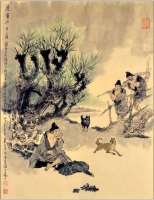Du Han River
Inscribed on the Wall of an Inn North of Dayu Mountain
news begum
Early Luhun Village
Dongting night drinking
Yoshiki 1 for Shen quanqi poem
Zhao sent six valence
Question Old Mr. Chang conifer
After the independence of other places of hope Lantian Village
Wun Sha Lu gift articles Buddhist monk
Rain come from Minoyama
初至崖口
From the source to Tanzhou Xiang Hengshan County
Send five crossing into the typical agricultural village Li Shi
The Dongting Lake
King Long Quadrennium Spring temple sea
Thermae Village Be on one's back Jiyangqijiong
A Tianzheng Jun Jing-Quan Tian Zhengjun a tour for rock
from Hengyang Ye can to Shaozhou honorific title for a Buddhist monk
appear Zhongnanshan Evening glow Supervisor teachers not to call
swim Hokkeji
lodge for the night Yunmen Temple
Spring Lake interest and charm of antique taste
You Luhun Zhongnanshan from Get down from a horse for a rest Lin Shi Ling fragrant Allograph A Lee Scheeren appropriate
| Multiple poems at a time |
Du Han River
渡汉江
Song Zhiwen
Ridge off external audio books by re-experience the spring and winter.
More recent hometown of confidence, afraid to ask come.
The above thinking, understanding the process, can make us clever lyric poem in this art, have a more profound experience. Layer progressive with the poet recalled, explained the background immediately after the direct expression of the poet, without reservation to talk out feelings of ambivalence and pain. However, the reader is required after some careful chewing to experience this special state of mind, to communicate with the author's mind. This highly concise lyrical approach that works with the omitted language, access to a very far-reaching artistic effect.
[Appreciation]
This is from the Long River Song asked the state (now Guangdong Luoding County) devaluation of the Taogui via the Han River (refer to the section of the Han River near Yangyang), written by a poem.
Song said that in his home village, asked Fenzhou (now near the Shanxi Fenyang), one that in Hongnong (today Lingbao southwest), from the poem "Han River" than away. The so-called "near Town", but from the mental habit of speaking, just as at home in Beijing today who had crossed the Yellow River to feel "close to town" as (Song of the question, this is also not Taogui home, but living in Luoyang hide .) Stands to reason that these two sentences seem to be written as "more cut near their hometown, eager to come to ask," written by his writing is completely contrary to natural that: "In recent nostalgia more timid, afraid to ask come." Carefully ruminate, they feel the only way out of the first two sentences revealed by "the provisions of scenarios." Demoted because of the Ridge home, the family for a long does not receive any audio, on the one hand they miss their family day and night, on the other hand always worried about the fate of his family, afraid of their own implicate due or for other reasons have been unfortunate. "Sound off the book" The longer such thoughts and fears are more development toward the poles, forming both looked forward to the audio books, audio books fear the arrival of the ambivalence of the state. This ambivalence, in the derogatory way the Taogui, especially through the Han River, close to home after that with a further dramatic development: the original fear, anxiety and vague foreboding, at the moment seems to be on the road as soon confirmed by an acquaintance met into the harsh reality of living; and to dream of long-term desire to reunite with their families will be immediately crushed by the merciless reality. Therefore, the "feeling more cut" into the "feeling more scared," "anxious to ask" has become a "dare not ask." This is in the "Ridge external audio book off" this particular case, the inevitable development of psychological conflict. Through the "Love is more cowardly" and "not ask", the reader can strongly feel the occasion of the poet the urgent desire of strong self-suppression and the resulting mental anguish. The Writing is clear, full of fantastic and the twist of chewing.
【Source】 卷53_35
Created by: 戴玨
